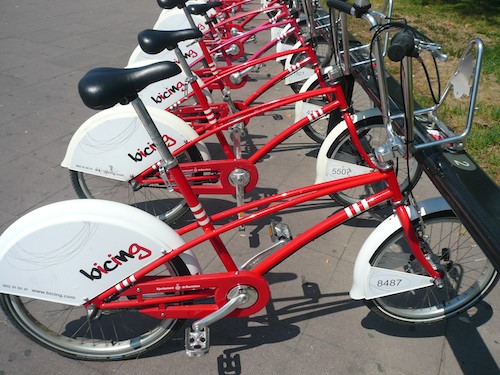In her article "When Bike Sharing Fails," Regina Winkle-Bryan drops an interesting fact: Barcelona's bike-sharing program Bicing is operated by ClearChannel, the right-wing American media company, and they did a terrible job with the launch. A new article by Carlosfelipe Pardo in Global Urbanist explores the prospect of bikesharing in London, and he explains why media companies run bikesharing programs around the world and why that's a bad thing:
There is no public bicycle system in the world that has been able to finance itself only by operating costs. Most city governments have yet to be convinced that cycling is good for the city and that it should be promoted strongly. Thus, from Vélib' to Bixi to Ecobici, these systems are not operated by a city government nor financed by them. They are almost all given as 100 per cent concessions to a private operator, who must subsidise their operations with government funds or with revenue from other areas.
In the case of Paris, Vélib' is run by the advertising company JCDecaux who, in return for operating the scheme, has exclusive rights for all street advertising in the city. Stories from government hallways tell that the advertising giant has greatly inflated the prices of the bicycles, the operating costs, and in some cases that the level of vandalism has been exaggerated.
The same cross-subsidy model is used by JCDecaux in Lyon, and by their competitor ClearChannel in Barcelona and Washington DC. Advertising companies typically propose the same model when selling public bicycle schemes to other cities.
On the other hand, Germany has tough anti-monopoly regulations which rule out such schemes. Instead, local rail operating company Deutsche Bahn developed their own call-a-bike scheme subsidised as part of the public transport system. Santiago de Chile has set up a local system in the borough of Providencia, fully subsidising a local company, B'easy, to operate the scheme, using local, mostly manual, technology.
Coming back to London, I would propose that we should not satanise the privatisation of roads or public services if done properly … yet I can only apply this to car-related infrastructure, not bicycle-related.
Bicycle infrastructure is low-cost and high impact. It only takes a tiny fraction of a city's budget to deliver a government-owned and operated cycling programme. If Santiago de Chile can manage it, so can London, especially since, as Simon Jenkins points out, London has money to burn these days. There is also a risk in the contracting of private operators that a breakdown of relations causes an operator to terminate a scheme unilaterally or remove cycle infrastructure over a breach of contract. Cities should not leave themselves vulnerable to these possibilities.
If a government seriously understands that promoting cycling generates benefits in public health, urban space efficiency, economy, environment and carbon emissions, it should not be necessary to look for private partnerships to pay for public bicycles, cycle lanes, covered and guarded bicycle parking, and all other cycling infrastructure. We don't seek these arrangements for pedestrians, nor should we for cyclists.
It's important to note that Pardo is ideologically against privatization; he spends the first part of the essay arguing that some roads ought to be privately run.









